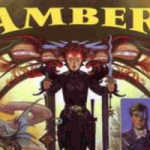Words as Actions
April 4, 2011 - Games / Mouthwash
Shortly before my blog’s hiatus, I wrote this post, in which I talk about the kind of conversation systems you see in games. I was particularly concerned with the lack of variety as compared to, say, combat systems. Everything seems to be some combination of response triggering and branching paths.
People sometimes blame the blandness and linearity of game conversation on the cost of voice acting or the difficulty of writing lots of text. The implication seems to be that if you could easily generate infinite dialogue lines, the branching space would be big enough to get interesting. But I think this misses the real problem with trigger/branch systems.
The biggest reason conversation models are usually pretty boring is sequencing. All these systems assume that without some level of hard-coded control over the sequencing of lines, there’s no way to make a conversation make sense. Branching trees are popular because they offer some freedom to the player, but always know exactly what sequence of lines led up to the current state and what lines can follow. Likewise, in response triggering, a line spoken by the player and a line spoken by an NPC are always paired up neatly. Both methods offer a lot of control over the order in which lines happen.
This is a severe limitation! There’s not much you can do to mix things up within those constraints. But the constraints seem to exist because written dialogue is seen as such a delicate, context-sensitive thing that relinquishing control over the order of lines will inevitably lead to nonsense. Games with unusual conversation mechanics are almost always those that abstract conversation to the point that there isn’t actual dialogue anymore.
Take The Sims, for example. That conversation system pretty much ignores sequencing altogether, letting the player pick generic actions like “Flirt” or “Insult” that have associated effects on the game state, such as making an NPC like you more. Conversation is no longer about exposition, illuminating character, telling a story, or what have you: it’s just a set of social functions.
I believe that there’s a big untapped space between these two extremes. And I think the trick is to take the basic idea of The Sims – treating lines of dialogue as actions that affect the world or the NPCs somehow – and expanding upon it. You’d have to give up control over the order of dialogue. Instead, you’d have to start thinking about what defines the state of a conversation, and how the things we say affect that state. There’s a lot of approaches you could take within this space. I’m working on one, and I’ll write more about it later.


